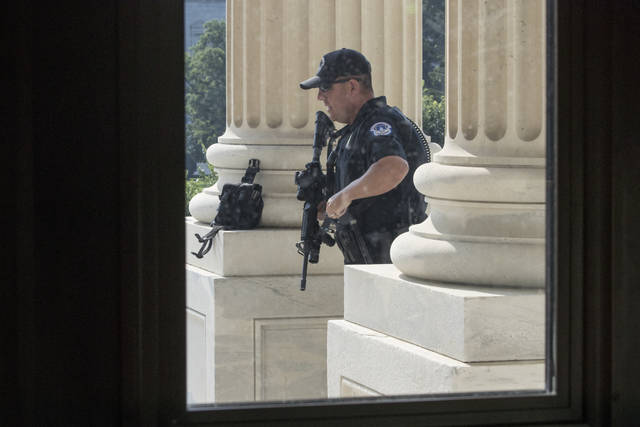Panel says lawmakers may use campaign funds on home security

ASSOCIATED PRESS
U.S. Capitol Police have investigated more threats to members of Congress in the first six months of the year than in all of 2016, says the chief law enforcement official for the House, as Majority Whip Steve Scalise remains hospitalized after a gunman opened fire at a baseball practice nearly a month ago.
WASHINGTON >> Lawmakers can use campaign funds to boost security at their homes, says a federal panel as House Majority Whip Steve Scalise remains in fair condition at a Washington hospital after a gunman opened fire at a baseball practice nearly a month ago.
The Federal Election Commission voted 5-0 on Thursday to let lawmakers use campaign money up to $15,000 for “nonstructural” security systems. The commission cited rising threats of violence against members of Congress.
The commission based its decision on a request from House Sergeant-at-Arms Paul Irving, the chief law enforcement official for the chamber. Irving said threats against members of Congress have soared. The U.S. Capitol Police investigated 902 such threats last year and 950 just halfway through this year.
Scalise, R-La., and four other people were injured June 14 when a gunman opened fire on a practice in nearby Alexandria, Virginia. U.S. Capitol Police and other officers returned fire and killed the gunman.
The 51-year-old congressman was struck in the hip, and the bullet tore into blood vessels, bones and internal organs. He has undergone several surgeries, including one on Thursday for an infection.
The FEC said if the threat environment diminishes significantly, then Thursday’s conclusion may change. Federal law generally prohibits federal lawmakers and candidates from converting campaign funds to personal use.
Don't miss out on what's happening!
Stay in touch with breaking news, as it happens, conveniently in your email inbox. It's FREE!
Previously, the commission had allowed campaign funds to be used for home security in just three instances when lawmakers faced ongoing threats to their safety and that of their families. In all three cases, the Capitol Police also recommended specific security upgrades to the lawmakers’ residences. The commission concluded the threats would not have occurred if not for their holding of public office.
Rep. Gregg Harper, R-Miss., chairman of the Committee on House Administration, also clarified the nature of the threat, telling the commission that the threats necessitated a pro-active response rather than a reactive one.
“Members are unfortunately no longer able to wait until confirmation of a threatening communication before taking prudent steps to protect themselves and their family,” Harper said.



